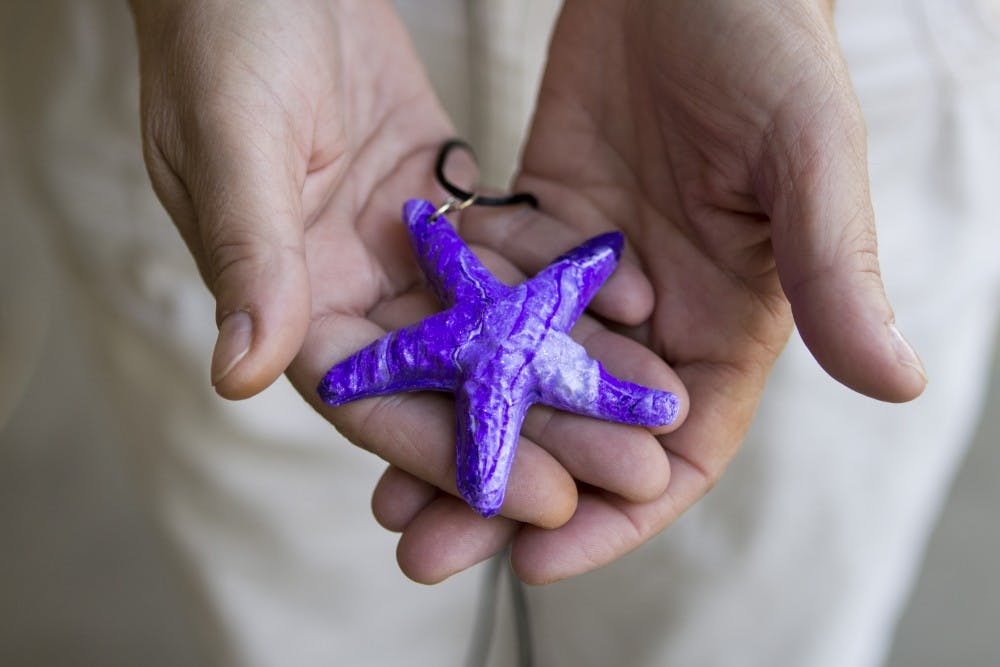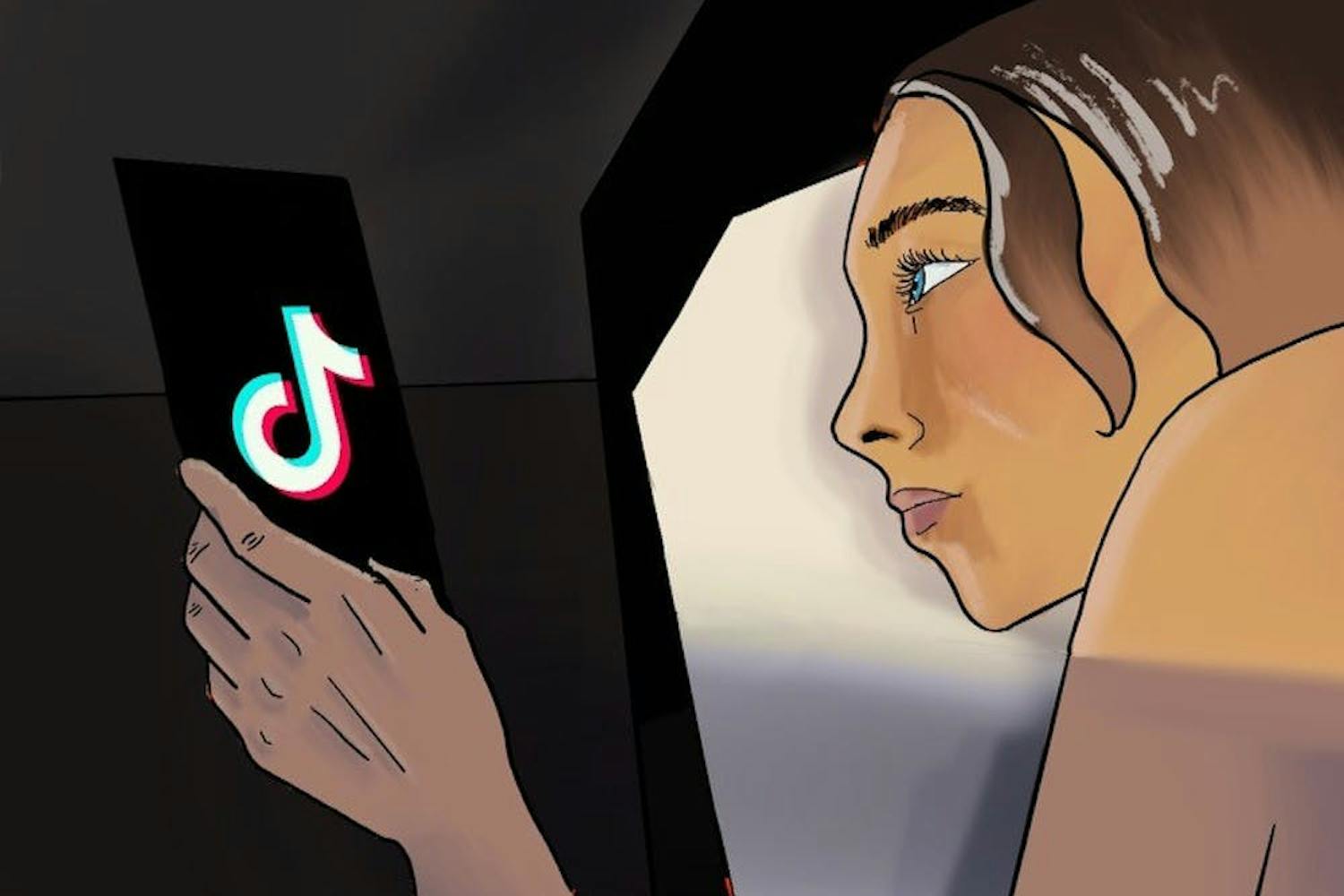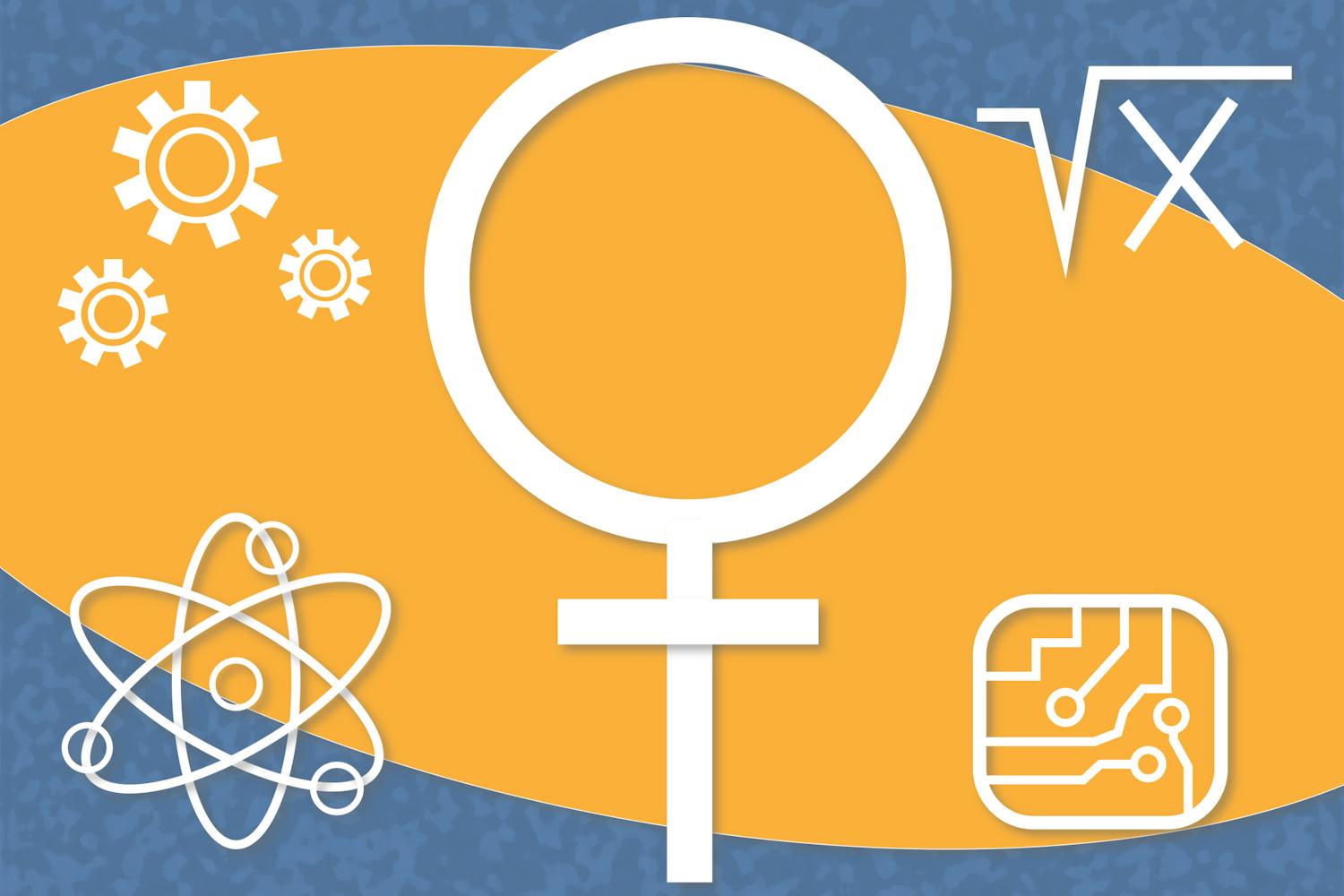 Lois Lucas, an intake specialist at the DIGNITY Programs in Phoenix, holds a starfish that was given to her at the diversion program. Women who enter the diversion program at DIGNITY often make starfish keychains and jewelry during their stay. (Photo by Dominic Valente)
Lois Lucas, an intake specialist at the DIGNITY Programs in Phoenix, holds a starfish that was given to her at the diversion program. Women who enter the diversion program at DIGNITY often make starfish keychains and jewelry during their stay. (Photo by Dominic Valente)A decade ago, Carolyn Jean Jones made a radical change in her life, stepping out of a lifestyle in which she had spent the better part of three decades.
Jones had been a prostitute, alcoholic and drug addict during that time and said her descent into that life began when her parents divorced.
“I had a good mom, (and) I had a good father,” Jones said. “(But) for whatever reason they separated, and when they separated, that led me to be two different girls.”
Jones said after her parents divorced and each remarried, she often found herself acting one way at one home and a different way at the other.
“So I became two girls, and had to … almost feel like I led two lives,” she said.
Growing up going in two different schools where she needed to act and blend into two different lives became difficult for her, Jones said.
It was also during school that Jones said she often felt insecure and bullied as a child.
“I felt like I wasn’t smart enough. I was kind of heavy, you know, kind of a heavy little girl,” she said. “So I was going through a lot of emotional issues, personal issues. … I had no self esteem.”
After the divorce, Jones said her mother moved her and her siblings out of the tough neighborhoods they had been living in into a better neighborhood, but that only seemed to compound her problems.
“My mom worked really, really hard and she moved us out of the projects where we were living at,” Jones said. “We moved in this good neighborhood, and when we got to this good neighborhood, the kids over there were different types of kids.”
Moving into a better neighborhood seemed to only increase the stress of the double life she had been leading, Jones said.
“In the old neighborhood, kids over there say, ‘Carolyn, y’all think y’all too good,’ and in this new neighborhood kids say, ‘Y’all ain’t good enough,’” she said. “So now I don’t fit in, in this school, or this school.”
After struggling with the discord of a double life and acceptance of her peers, Jones said she began searching for different ways to fit in.
“I didn’t feel smart, so school really was boring to me," she said. "I really didn’t like school. I started fitting in good with the kids that ditched school and smoked cigarettes in the back and drank.”
She said she eventually began to hang out with older people, which led to a major life-changing event when she was 13.
“I was hanging out late at night, and I got in the car with somebody, these older boys … and I remember being 13, and being taken to South Mountain and being molested by these boys,” Jones said. “And for whatever reason, I felt like that was my fault.”
After being molested, she said she became very closed off and struggled with strong feelings of shame and depression.
“At the time I was 13, I felt like damaged goods,” Jones said.
To deal with these feelings, Jones turned to alcohol.
“I started drinking alcohol by the time I’m 13 (or) 14 years old,” she said. “The alcohol makes me feel numb. It makes me feel good … so by the time I’m 15 years old, I’m an alcoholic.”
It was at that time that Jones said she had had enough of feeling inadequate and guilty, so she ran away from home. It was then she was first introduced into the life of prostitution.
Jones said she was at bar when a man offered her $100 for sexual favors, and selling sex soon became a way for her make ends meet.
“So at that time, I done this, and this was just a way to survive,” Jones said.
At first, Jones said prostitution afforded her the things she needed to survive, but the feelings of inadequacy continued, so she began needing something stronger to pacify those feelings.
“Later on, it became a way to support my crack-cocaine habit, because when I started smoking crack, it numbs all the voices. ‘You’re not pretty enough. You’re not smart enough. You don’t fit in. You’re not like those other girls,” she said. “And on top of that, you (are) now a prostitute.”
Jones became embroiled in the lifestyle of prostitution and drug addiction, which took her in and out of prisons and rehab, she said.
Her life changed dramatically, though, when her sister, Janice, and a few friends were killed while working as prostitutes.
Her sister’s body was found in a shopping cart dumped in an alley in the area of 12th Street and Roosevelt, she said.
It was then that Jones felt that if she did not completely get out of that life, she would end up with a similar fate.
“When they killed my sister and killed all my friends, that left me just so broken, so full of fear, so full of anger,” Jones said. “Knowing that if I did not get out of that life, that I was too going to die.”
Moving online
Jones said she is lucky to have been able to get out of a life of prostitution, alcoholism and drug addiction.Now, she dedicates herself to speaking about the dangers of prostitution and what needs to be done to fix the problem.
There is a lot of work still to be done, Jones said, and even though some neighborhoods have gotten better, the problem has just moved elsewhere.
“You think, ‘Oh we did a good job of cleaning up that Van Buren,” she said. “But oh no, we didn’t do a good job. We did a good job in cleaning it up, but where did it go?”
A portion of Van Buren was once a considered a center of Phoenix’s red-light district.
Jones said a lot of prostitution has simply moved elsewhere.
It's among old-word professions that have gotten 21st century facelifts.
And a recent study by ASU looked to put a number on the pervasiveness of a burgeoning new marketplace for prostitution: the Internet.
“The Internet is now what we used to call ‘the track,’” Jones said.
The study, released in August, took a nationwide look at the number of people soliciting sex online from two common websites that allow personal ads.
Dominique Roe-Sepowitz, associate ASU professor and director of the Office of Sex Trafficking Intervention Research, said estimating the demand for online prostitution is a very difficult task.
Roe-Sepowitz said the Internet makes it easier to buy sex as people are able to simply pick up a phone and make an appointment.
“You get in your car and drive to a hotel, or they get in their car and drive to you," she said. "There’s no place to get caught."
The relative anonymity the Internet provides makes it difficult to estimate the numbers of men and women soliciting and purchasing sex online.
Roe-Sepowitz said to be able to get an estimate of the demand, she and her researchers placed decoy ads on Craigslist’s Casual Encounters section and Backpage.com’s adult entertainment and escort sections in 15 cities around the country, then monitored the information of people who contacted the ads.
“We placed two sex ads, one a Friday in June and one a week later,” she said. “We collected all of the phone numbers. We had texts and voicemails, people who just called and hung up. And we had 677 contacts around the country.”
The 15 cities selected attempted to represent the different regions of the U.S.
Some of the cities where decoy ads were posted included Houston, Phoenix, Las Vegas, Miami, Chicago, San Francisco and New York.
The study used a method called capture and re-capture, which is a common method when attempting to estimate the population of something difficult to find or relatively hidden, Roe-Sepowitz said.
“When you’re counting any difficult to find population like how many tigers are on a savanna, you can’t go count the tigers. … It’s very difficult to do,” she said. “Instead you go to a watering hole and you count as many tigers as you can, (then) go there a week later you see how many of the same ones are there and how many new ones.”
From there, using statistical formulas makes it possible to estimate a hard-to-find population, Roe-Sepowitz said.
Roe-Sepowitz said the estimated population of people attempting to buy sex online in the Phoenix area per day could fill the US Airways Center three times over.
“How do we wrap our head around the idea that 78,000 people are trying to buy sex in our community?” she said. “That’s a lot of people, and how are we ever going to change the way they feel about women and sex and intimacy?”
Of the 15 cities where decoy ads were placed, Houston ranked the highest with an estimated 169,920 people attempt to purchase sex, equaling about one in every five males or 21.4 percent, while San Francisco ranked the lowest at only .6 percent.
Roe-Sepowitz said the study does not necessarily show that there are more people attempting to buy sex online in Houston than in San Francisco, just that the websites where their ads were placed might be more popular some places and not so in others.
Eric Hedberg, faculty associate with the College of Public Programs, calculated most of statistical work for the study and said the study is a good starting point but is still simply an estimate.
“At this point, because we know nothing, these estimates at least give us something to go on,” Hedberg said. “This isn’t airtight, but it’s better than the nothing that we started with."
Working with Dignity
While a relatively new marketplace has been created online for the world’s oldest reputed profession, in Phoenix there are a number of programs and outreaches looking to help the men and women involved in the sex trade.One of these programs, Dignity, works to help adult women involved in prostitution and help men who have been convicted of purchasing sex, also known as Johns.
Many of the women who come to Dignity have run into problems with the law, and rather than doing jail time, they have the option of completing Dignity’s Diversion Program.
Cynthia Holt, the program's coordinator, said they look to educate and make these women aware that they have choices.
“What they’re doing is not the dream that maybe their pimp has sold them,” Holt said. “That it’s not glamorous, it’s not sexy and they’re not going to end up a millionaire living in a mansion.”
When a girl comes into the Diversion Program, the first thing they do is create a case plan to determine what kind of help the girl might need, Holt said.
“The first component is the intake process, then they have the weekly groups that they’re required to attend … and then we have our week-long class, the 36-hour class,” she said.
All together, most girls will end up going through 10 weekly sessions, and then complete the 36-hour class, which is broken up over five weekdays, Holt said.
Intake Specialist Lois Lucas said Dignity also provides a confidential safe house for women that provides housing for a full year.
Lucas said most of the women are found through outreach in local jails and at Maricopa County’s Tent City.
“When we have somebody (ready), we contact our residential housing. They have a badge to come in and do an intake with them right in the jail,” Lucas said. “They interview them — it’s a two-way interview — and they try to see if they’re a good fit.”
Lucas said once a girl has lived in the safe house for a year, she then has the option of moving into transitional living apartments provided by Dignity.
Another focus of Dignity is not just on helping the women, but also helping men who have been arrested for buying sex.
Once a month Dignity runs a class called Ops, where men can pay a fee of $827 to attend a class to avoid being convicted of soliciting prostitution, where they hear from former prostitutes like Jones.
“They hear the realities of prostitution, how it affects the community (and) how it affects their health,” Holt said.
Holt reaffirmed the massive challenge she and her fellow workers at Dignity and organizations like it face. On average, only 10 to 20 men attend the Ops class each month, while the study shows there are thousands seeking it every day, Holt said.
“These are only guys that are getting caught through the sting (operations)," Holt said. "Imagine all the guys that are doing it that don’t come in contact with the sting."
A similar organization called Streetlight USA, also in Phoenix, focuses its efforts on helping children between the ages of 11 and 18 who are trafficked or sexually abused.
President and CEO Lea Benson said it’s important to open up dialogue about prostitution and the trafficking of women and minors.
“When you hear the word prostitute or prostituted, most people want to throw it under the rug, and they think that it’s a choice,” Benson said. “It’s not a choice for many.”
Since Jones has gotten out of prostitution, she said she now dedicates her time to working with Streetlight USA and has become an outspoken and unabashed advocate against prostitution and sex trafficking.
Jones said she is so outspoken, because she was lucky enough to survive it and wants to use her story to help free others.
“I try to be as real as I can be," she said. "I’ve been there, done that. If I was or I wasn’t, if I did it, I did it. … Hell, it just don’t matter today. The blessing is, I survived it. And I survived enough … to free somebody else.”
Reach the reporter at mark.remillard@asu.edu or follow him on Twitter @markjremillard




